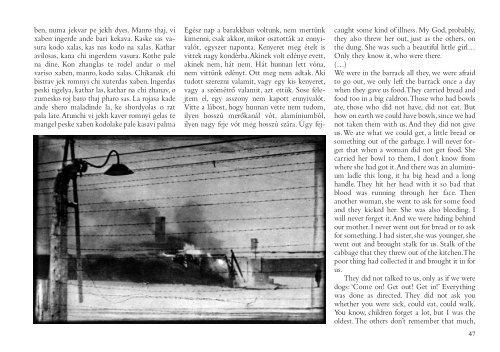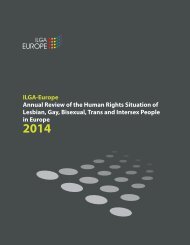Create successful ePaper yourself
Turn your PDF publications into a flip-book with our unique Google optimized e-Paper software.
en, numa jekvar pe jekh dyes. Manro thaj, vi<br />
xaben ingerde ande bari kekava. Kaske sas va -<br />
sura kodo xalas, kas nas kodo na xalas. Kathar<br />
avilosas, kana chi ingerdem vasura. Kothe pale<br />
na dine. Kon zhanglas te rodel andar o mel<br />
variso xaben, manro, kodo xalas. Chikanak chi<br />
bistrav jek romnyi chi xuterdas xaben. Ingerdas<br />
peski tigelya, kathar las, kathar na chi zhanav, o<br />
zumesko roj baro thaj pharo sas. La rojasa kade<br />
ande shero maladinde la, ke shordyolas o rat<br />
pala late. Atunchi vi jekh kaver romnyi gelas te<br />
mangel peske xaben kodolake pale kasavi pal ma<br />
Egész nap a barakkban voltunk, nem mertünk<br />
kimenni, csak akkor, mikor osztották az ennyivalót,<br />
egyszer naponta. Kenyeret meg ételt is<br />
vittek nagy kondérba. Akinek volt edénye evett,<br />
akinek nem, hát nem. Hát hunnan lett vóna,<br />
nem vittünk edényt. Ott meg nem adtak. Aki<br />
tudott szerezni valamit, vagy egy kis kenyeret,<br />
vagy a szömétrô valamit, azt ettük. Sose felejtem<br />
el, egy asszony nem kapott ennyivalót.<br />
Vitte a lábost, hogy hunnan vette nem tudom,<br />
ilyen hosszú merôkanál vót, alamíniumból,<br />
ilyen nagy feje vót meg hosszú szára. Úgy fej -<br />
caught some kind of illness. My God, probably,<br />
they also threw her out, just as the others, on<br />
the dung. She was such a beautiful little girl…<br />
Only they know it, who were there.<br />
(…)<br />
We were in the barrack all they, we were afraid<br />
to go out, we only left the barrack once a day<br />
when they gave us food. They carried bread and<br />
food too in a big caldron. Those who had bowls<br />
ate, those who did not have, did not eat. But<br />
how on earth we could have bowls, since we had<br />
not taken them with us. And they did not give<br />
us. We ate what we could get, a little bread or<br />
something out of the garbage. I will never forget<br />
that when a woman did not get food. She<br />
carried her bowl to them, I don’t know from<br />
where she had got it. And there was an aluminium<br />
ladle this long, it ha big head and a long<br />
handle. They hit her head with it so bad that<br />
blood was running through her face. Then<br />
another woman, she went to ask for some food<br />
and they kicked her. She was also bleeding. I<br />
will never forget it. And we were hiding behind<br />
our mother. I never went out for bread or to ask<br />
for something. I had sister, she was younger, she<br />
went out and brought stalk for us. Stalk of the<br />
cabbage that they threw out of the kitchen. The<br />
poor thing had collected it and brought it in for<br />
us.<br />
They did not talked to us, only as if we were<br />
dogs: ‘Come on! Get out! Get in!’ Every thing<br />
was done as directed. They did not ask you<br />
whether you were sick, could eat, could walk.<br />
You know, children forget a lot, but I was the<br />
oldest. The others don’t remember that much,<br />
47



